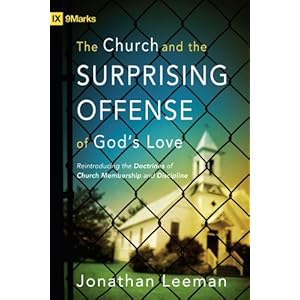
I’ve been reading The Church and the Surprising Offense of God’s Love by Jonathan Leeman, and although I’ve had some disagreements with the book, it has been an excellent read. I wanted to share a few quotes that have been particularly challenging for me.
Below is a good challenge to teaching “community” as the solution to our problems in the church rather than the gospel:
When the theologian or pastor talks the talk of relationship and community rather than the talk of obedience and holiness, he just might be hawking a postmodern prosperity gospel. The poor man’s prosperity gospel is: “Never mind all that stuff about obedience and holiness; Jesus wants to make you rich and happy!” But many of us today in the West are rich. We don’t need the poor man’s prosperity gospel. Rather, we suffer from ennui, angst, and media overload. The relationships we do have are shallow and unsatisfying, so the intellectual sophisticate offers a postmodern prosperity gospel instead: “Never mind all that stuff about obedience and holiness; Jesus will give you relationships, purpose, community.
Next, some thoughts regarding the degradation of external authority, and the true problem of individualism:
I do not believe that the communitarian proposal provides any true antidote to individualism and its corollaries such as consumerism. They argue that community is the antidote to individualism. It’s not, which brings us to one of the central themes of this book: the real problem is anti-authority-ism. At the risk of sounding like the late modernist Friedrich Nietzsche or the radical postmodernist Michel Foucault, it’s all about power. At the risk of sounding like a fundamentalist Sunday school teacher, it’s all about disobedience. Some contemporary writers get this; others don’t. It’s not quite enough to say that the problem of modernity was individualism, because the term is too vague. The problem bequeathed by Descartes and everyone of his ilk is more accurately described as autonomous individualism—auto-nomos meaning “self law”—where we’re letting the adjective, not the noun, do the real work of making our point. The solution to individualism is not community. The solution—one fears to say it without pages of qualifications—is to reintroduce a conception of submission to God’s revealed will as it’s located in the local church. The campaign that Western culture has been waging for several centuries for the individual has been a campaign waged against all forms of authority. From elementary school through graduate school, Western educators have taught us to question authority: the authority of the church because of what it did to Galileo; the authority of the king because of his usurpations; the authority of the majority because of its tyrannies; the authority of males because of their exercise of brute strength and acts of oppression; the authority of the Bible because of its alleged contradictions; the authority of science because of its paradigm shifts; the authority of philosophy because of its language games; the authority of language because it has been deconstructed; the authority of parents because they’re not cool; the authority of the market because of its extravagant inequalities; the authority of the police because of their fire hoses and night sticks; the authority of religious leaders because they’ll make us drink the Kool-Aid; the authority of the media because of its biases; the authority of superpowers because of their imperialism. Are there any authorities left to question? When it comes to what we should believe and how we should live, a ubiquitous suspicion of authority lurks in the minds of most Westerners today, in part because we’re familiar with authority’s savage history of abuses.
With respect the previous thoughts, below is the solution Leeman proposes:
The solution to individualism is not community. The solution—one fears to say it without pages of qualifications—is to reintroduce a conception of submission to God’s revealed will as it’s located in the local church.
His basic argument is that submission the the local church is essential to the nature of biblical community which rightly reflects God’s glory in the world. We simply cannot reject authority in favor of egalitarian community because it undercuts the very nature and character of God. This book has been an excellent balance to many of the other books I have been reading as of late.
Finally, in an unrelated note, I found this quote to be helpful in articulating a God-centered view of the value of human life:
What’s interesting to notice in the Genesis 9 passage cited above is why human life is described as “precious”: “Whoever sheds the blood of man, by man shall his blood be shed, for God made man in his own image” (v. 6). The preciousness of human life, it seems, is found entirely in the fact that humans image God. Our worth is derivative. It’s derived from the one we image. Killing a human is wrong not because God loves us more than anything, but because he loves his own glory more than anything.
Leave a Reply